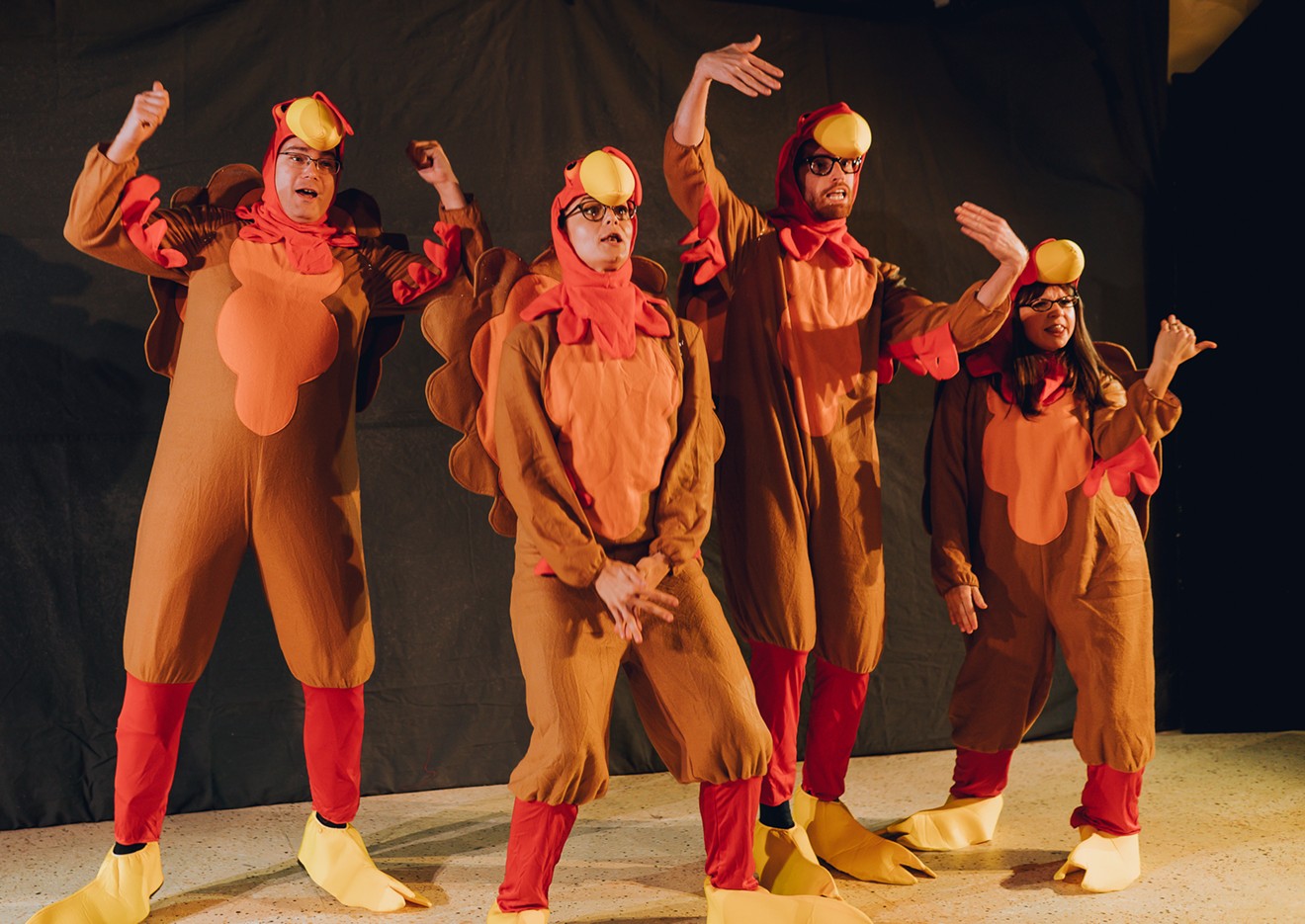At this point in time, most people know that the origins of Thanksgiving are not so savory as the meal we celebrate them with. Although we were raised with charming ideas of pilgrims and Native Americans planting corn, sitting down at table together, eating turkey and watching football, Americans have recently become more aware of our erasure of the violence and genocide surrounding the first Thanksgiving. Thus, The Thanksgiving Play at Undermain Theatre isn’t so much trying to educate its audiences about the true history of Thanksgiving as make fun of the white Americans who have become obsessed beyond belief with honoring the Native American side of the traditional story. The play satirizes “woke” millennials who try so hard not to offend anybody in any way possible that they end up doing literally nothing.
The Thanksgiving Play, at Undermain Theatre now through Dec. 1, tracks the first day of rehearsal for a middle school Thanksgiving pageant. Gung ho liberal vegan feminist drama teacher Logan (Jenny Ledel) and her yogi boyfriend Jaxton (Garret Storms) welcome two new teammates to their production: a middle-aged history teacher named Caden (Ben Bryant) to help them produce a historically accurate pageant and, all the way from Los Angeles, a gorgeous actress named Alicia (Kelsey Milbourn). Alicia is supposed to act as the pageant’s Native American representative — until everyone finds out that she’s actually a white actress who advertises herself as belonging to six different ethnicities in order to get more roles.
What you get, then, is four white people trying to put on a play about Native American history without being offensive toward Native American people. This is when The Thanksgiving Play becomes subtly meta: the play brings attention to the cultural issues surrounding Thanksgiving by having its four white actors play four white actors who are putting on a play that brings attention to the cultural issues surrounding Thanksgiving. Say that five times fast!
But that meta-ness isn’t the central thing this play brings to the table. It would seem, actually, that there is no central thing this play brings to the table — no metaphorical Thanksgiving turkey, shall we say.
Instead of focusing on and fully developing one issue to satirize, playwright Larissa FastHorse juggles every sociological issue white millennials consider themselves to be “woke” about. Although Native American culture and the true history of Thanksgiving are primary topics, the play also deals with cultural appropriation in general, environmental consciousness, feminism, modern beauty standards, colorblind casting (the casting of characters without regard for the ethnicity of the actor or the character), straight white men learning to feel “less than” and the modern generation’s inability to understand anything but Disney movies, to name but a few.For all of its structural problems and flailing attempts at depth, The Thanksgiving Play is downright hilarious. Humor is the saving grace that makes the play worth seeing.
tweet this
If that sounds like too many issues for one play to deal with, it is. Thematic complexity can be a great thing, but only if each theme is developed to the point of poignancy. In The Thanksgiving Play, each social problem is introduced and satirized in a few spiffy lines, but none are onstage long enough for us to really understand or care about the issue.
Part of why the play’s points are difficult to fully grasp is that the plot does little to hold them together. The plot itself is simple: The characters are trying to devise a pageant, and the attempt involves plenty of conflict and something resembling a resolution. But most of the issues the play deals with are irrelevant to this simple structure, which makes them distracting rather than edifying. As a result, the audience loses sight of what’s actually happening in the play. By the time the resolution comes, we’ve sort of forgotten what the characters were aiming toward in the first place.
For all of its structural problems and flailing attempts at depth, The Thanksgiving Play is downright hilarious. Humor is the saving grace that makes the play worth seeing. FastHorse has strung the play with brilliant one-liners, but it isn’t just full of witticisms. There are also several skits and scenes throughout the play, each a perfect self-contained bite of laughter. The characters attempt some improv or rehearse a scene from their pageant to excellent comedic effect, and the play’s acts are interspersed with bizarre but hilarious segments from unrelated (and wonderfully offensive) Thanksgiving pageants.
The well-written comedy is also performed with ease and conviction by the four actors, who have a strong comedic dynamic. Storms and Milbourn are especially funny both in their delivery of lines and through the ever-powerful means of body language. Milbourn’s Alicia struts her stuff far more than anyone asked her to, and Storms’ Jaxton performs increasingly advanced yoga postures throughout just about every line of dialogue (without breaking a sweat). Their performances are over-the-top, which is just what’s necessary to bring the types of people they play from obnoxious to funny.
This play might be perfect if it wasn’t trying to be more significant than it is. Although the issues the play brings up are very real and demand to be addressed, this play ultimately doesn’t set the stage for them. But even if it doesn’t make you doubt the ethics of Turkey Day (or doubt the ethics of doubting the ethics of Turkey Day, which seems to be part of the point of the play), it is bound to make you laugh yourself silly right before you tuck into your Thanksgiving feast.











